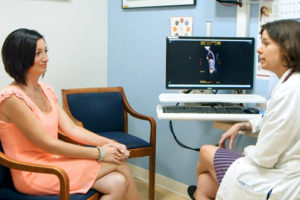The Lahey Health Cancer Institute (LHCI) offers state-of-the-art breast cancer screening and diagnostic technology at convenient locations north of Boston.
Early Detection is the Goal
 Detecting breast cancer at its earliest stage offers the best long-term prognosis, so early detection is an important goal.
Detecting breast cancer at its earliest stage offers the best long-term prognosis, so early detection is an important goal.
Breast Cancer Screening Advanced Diagnostics If Cancer Is Confirmed Risk Assessment Genetic Counseling
Breast Cancer Screening
Routine breast cancer screenings start with mammograms. At Lahey Health, we offer 3D digital mammography exams with computer-assisted detection (CAD). CAD is a computer-based process designed to analyze mammography images for suspicious areas. It serves as a “second pair of eyes” for our radiologists.
At LHCI, we believe the skill of our radiologists is second to none. Their careful, meticulous, and expert analysis of each mammogram they read has led to the detection of many tiny cancers that became just a speed bump in the lives of our patients instead of a road block.
If a mammogram does reveal an area of concern, we offer additional diagnostic imaging studies such as breast ultrasound, breast MRIs, and possible image-guided core needle biopsies for further analysis. With these treatment modalities, we can detect cancer at its earliest stages, often long before it can be felt as a breast lump. We also can determine if an abnormality on a mammogram is ultimately not suspicious, and does not require further treatment.
Tomosynthesis
3D mammography is an FDA-approved advanced technology that takes multiple x-rays of breast tissue to recreate a 3D picture of the breast. It is also called breast tomosynthesis. Very low x-ray energy is used with 3D mammography, so your radiation exposure is very low. The multiple images from 3D mammography give doctors a clearer image of breast tissue and make it easier to detect breast cancer. Women with dense breast tissue in particular may benefit because from the clearer picture provided by this technology.
Advanced Diagnostics
If breast cancer is suspected, we have a number of ways to investigate it further, including stereotactic core needle biopsies MRI-guided core needle biopsies, , ultrasound-guided core needle biopsies, and PET CT scans. Everyone’s cancer is unique, and identifying the type and extent of cancer is a crucial step in determining the best treatment.
If Breast Cancer Is Confirmed
If your test results show breast cancer, be assured that you will not be in it alone. We will pair you with a patient navigator to help guide you through treatment decisions and survivorship. We will support you, educate you, and treat you according to best practices and the highest clinical standards.
Emphasis on Education
At the Lahey Health Cancer Institute, we place strong emphasis on education. Our dedicated breast surgeons and nurse practitioners conduct a thorough assessment to determine your risk for breast cancer and provide expert clinical breast examinations. They help you to better understand your own breast tissue and perform your own breast self-exam if you so desire. Our professionals work closely with our professional staff of radiologists to interpret your breast imaging studies using the latest and most advanced technology. Any woman can refer herself to LHCI for a mammogram and clinical breast exam.
Breast Cancer Risk Assessment
The risk for breast and ovarian cancer is not the same for all women. Some women need more advanced screening beyond the standard recommendations. But it’s not always clear who may be at higher risk.
To meet this challenge, Lahey Health has introduced a computerized Risk Assessment Screening Tool to help physicians more accurately determine their patients’ risk for breast and ovarian cancer. The earlier cancer is found, the greater the chance of successful treatment. This new tool helps women and their doctors determine what level of screening is best for them.
With our Risk Assessment Screening Tool, you use an electronic tablet at the time of your mammography appointment at a Lahey Health imaging center to confidentially answer questions about your health and family history. Your doctor then sees a summary that calculates your five-year and lifetime risk of breast and ovarian cancer, using nationally recognized risk models.
The doctor can then use this information to decide if you might benefit from a higher level of screening beyond regular checkups and mammograms.
Genetic Counseling
If you have been diagnosed with breast cancer or have a family history of breast cancer, you may be interested in genetic counseling – and Lahey Health is among the pioneers in this area.
We know that genetic mutations in breast cancer go beyond patients with BRCA genes. We have a robust Familial Cancer and Hereditary Risk Assessment program that is staffed by certified genetics counselors for all types of cancer, not just breast cancer. If you are at higher risk because of your family history, we can provide guidance on how to manage your risk.

